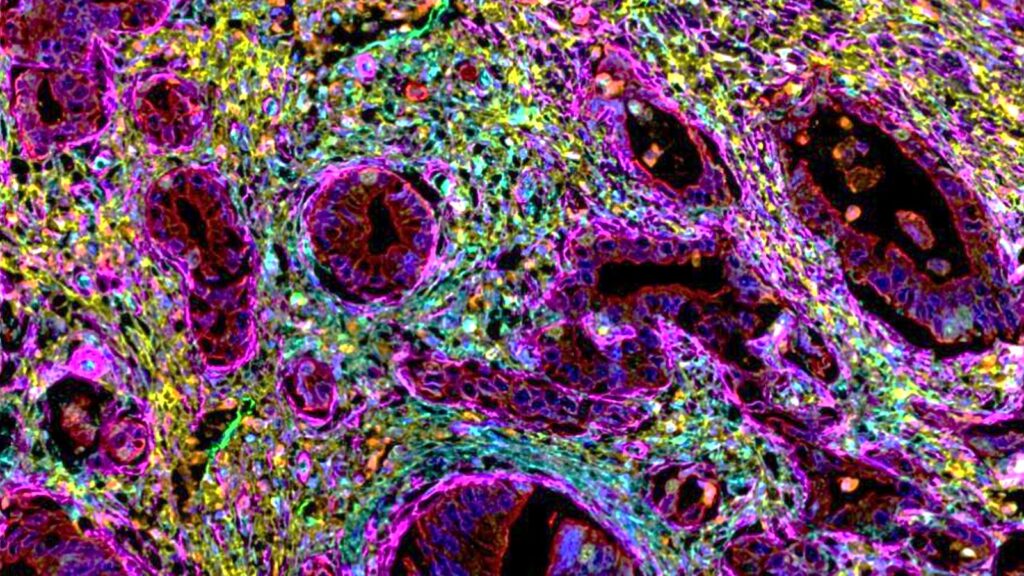How non-cancerous cells in pancreatic cancer may weaken the immune system's response
New research sheds light on how certain non-cancerous cells in pancreatic cancer can affect the body’s natural immune defences and could have a significant impact on patients’ survival. The study, published in Cancer Communications, was led by researchers at Barts Cancer Institute, Queen Mary University of London.
Pancreatic ductal adenocarcinoma (PDAC) is the most common form of pancreatic cancer. It is highly aggressive, is often detected at a late stage and responds poorly to therapy, with only around 10% of patients surviving for five years or longer. PDAC is set to become the second leading cause of cancer-related deaths in the US by 2040 – as such, finding improved treatments for this disease is becoming increasingly critical.

A new study, led by doctoral student Rachel Fincham under the guidance of Hemant Kocher, Professor of Liver and Pancreas Surgery at BCI and Barts Health NHS Trust, focused on non-cancerous cells known as stromal cells, which surround the tumour in pancreatic cancer. Previous work from Professor Kocher’s lab (including the STARPAC clinical trial) suggests that targeting the stromal cells and calming their activity could improve outcomes for patients.
In their latest work, the team investigated the potential interactions between stromal cells – specifically pancreatic stellate cells and cancer associated fibroblasts – and a type of immune cells called natural killer (NK) cells. NK cells are part of the body’s first line of defence against cancer. However, the study found that when NK cells were exposed to resting stromal cells, their ability to attack pancreatic cancer cells was significantly reduced.
Results from cell line experiments, mouse models, and samples from patient tissues, performed in London and Singapore (under guidance of Dr Joe Yeong) revealed a two-way interaction between NK cells and stromal cells. When these cell types were grown together, the behaviour and biological activity of both types were changed dramatically.
“Our work provides novel insights into the relationship between the immune system and stromal cells in pancreatic cancer.”
— Professor Hemant Kocher
The study also revealed that standard cancer treatments could alter the positioning of NK cells in mouse models of cancer. Importantly, in tissue samples from patients, the researchers found that greater physical distance between NK cells and stromal cells was linked to longer survival times.
These findings suggest that treatments aimed at modifying the behaviour of stromal cells could make the immune system more effective in tackling pancreatic cancer, potentially improving outcomes for patients.
Professor Kocher said: ‘Our work provides novel insights into the relationship between the immune system and stromal cells in pancreatic cancer. Our exciting findings highlight the prognostic implications of natural killer-stromal cell proximity in pancreatic cancer, and we suggest its potential use as a tool for patient stratification for diagnosis, prognosis and treatment.’
This research was conducted by researchers from Barts Cancer Institute, the Institute of Molecular and Cell Biology (IMCB), Singapore, the Centre for Quantitative Medicine, Duke-National University of Singapore (NUS) Medical School, the Department of Anatomical Pathology, Singapore General Hospital, the Cancer Science Institute of Singapore, National University of Singapore, and the Barts and the London Hepato-Pancreato-Biliary (HPB) Centre, The Royal London Hospital, Barts Health National Health Service Trust. Funding was provided by Barts Charity and A*STAR Research Attachment Programme (ARAP) PhD studentship. The Pancreatic Cancer Research Fund Tissue Bank is funded by Pancreatic Cancer Research Fund.
Category: General News, Publications

No comments yet